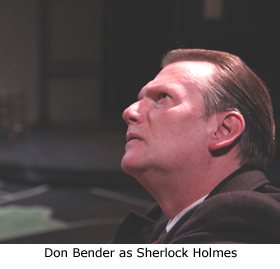
Acting the same character in the same play is one thing, but tailoring a persona to the demands of different authors, directors and artistic concepts over a series of productions is quite another. A quartet of Chicago actors whose resumés list multiple portrayals of heroes drawn from classic genre fiction weigh in on the joys—and headaches—of wearing the same personality over several seasons.
The record-holder for repeat roles is Mark Richard, whose appearances in the role of Bertie Wooster, P.J. Wodehouse's bumbling English playboy, span seven fully staged productions between 1986 and 2000, in spaces ranging from a conference room in the Cultural Center to the boathouse-sized mainstage of the legendary Ivanhoe Theatre complex.
"The blessing of inhabiting the same character every year, with new scripts, new directors and new cast members," recalls Richard, "is that it allowed me—and Page Hearn, who took over the role of Jeeves from Kenneth Northcott in 1995—to develop a performing relationship facilitated by a kind of mutual shorthand based in our knowledge of what to expect from each other."
Peter Greenberg portrayed Lord Peter Wimsey, Dorothy Sayers' detective hero, in four adaptations by Frances Limoncelli for Lifeline Theatre between 2001 and 2009, three of them with Jennifer Tyler playing Wimsey's consort and fellow detective, Harriet Vane. Both readily acknowledge the advantages of having the same adapter for the duration.
"From the beginning, Frances had a clear vision of who these people were and what they wanted," Tyler declares, "and that consistency made our jobs easier."
Greenberg sees it differently, however. "For me, the nicest thing was that Sayers had Lord Peter mature over the years, so that he's not the same in each story. Frances wanted to tell a story over the whole series, yes, but that motivated her to focus the individual plays in ways that multiple adapters might not have."
The latest actor to take on a repeat character is Don Bender, now making his third appearance in the role of Sherlock Holmes in The Sign of the Four for City Lit Theater. Did he encounter discrepancies between adaptations?
"Any discrepancies I found arose from Doyle himself," Bender shrugs, "For example, the Holmes in Sign of the Four isn't as weary as in Hound of the Baskervilles, nor as confident as in A Scandal In Bohemia. At the beginning of this latest play, Holmes is retreating into cocaine to escape what he calls the 'dull routine of existence', and later he quotes from Goethe, Winwood Reade and J.P. Richter as he muses on the 'strange enigma' that is Man."
Do actors get bored playing the same character again and again? "Never!" asserts Tyler, "Harriet Vane is a fascinating woman—always a pleasure and a challenge to play", while Greenberg concurs, "Even after four plays in eight years, I was still looking for ways to make Lord Peter more comprehensible."
Richard flatly rejects the notion of familiarity breeding contempt. "How can loving and being loved be boring? I loved Bertie and Jeeves, and so did the audiences. By 2000, however," he notes, ruefully, "I had a son, a day job, and I was older, stouter and balder than I thought Bertie should be."
This brings up the uncomfortable subject of actors eventually becoming too old for their roles—but Sherlock Holmes isn't really an age-specific character. Could Bender be happy playing the supersleuth for another decade or two?
"The question is really whether I would be cast as the character—an actor can play whatever he's given—and I'm aware that I will probably age out of the traditional view of Holmes eventually," Bender acknowledges, "Even so, I'd have to say no—Holmes is a great joy to act, but I wouldn't want to restrict myself to the exclusion of other roles."
Mary Shen Barnidge
Contributing Writer

 Follow Us On Twitter
Follow Us On Twitter